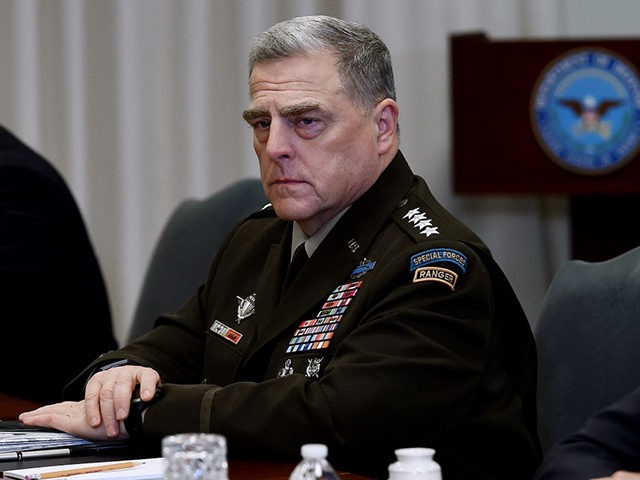Chairman of the Joint Chiefs of Staff General Mark Milley confirmed Thursday that the administration of President Joe Biden will help Afghan nationals who aided the U.S. military leave the country before the military concludes its departure in September.
Under an agreement brokered between the Taliban and the administration of President Donald Trump, the United States planned to remove all troops from Afghanistan, and thus conclude the 20-year-old Afghan War, by May 1, 2021. Biden broke the agreement, outraging the Taliban, and announced troops would instead remain in the country through September 11, 2001, the anniversary of the al-Qaeda attacks that prompted America’s initial invasion of Afghanistan. The Taliban terrorist organization, which governed Afghanistan in 2001, has longstanding ties to al-Qaeda that it vowed to break as part of the deal with Trump.
Secretary of Defense Lloyd Austin told Congress in a hearing Thursday that the military withdrawal from Afghanistan is “slightly ahead” of schedule, referring to Biden’s delayed schedule and not the original May 1 exit plan.
While taking credit for America’s withdrawal from Afghanistan after delaying it, the Biden administration has emphasized that America will continue to play a significant civilian role in the country, including the investment of millions of dollars into the legitimate Afghan government. The Taliban considers the government in Kabul a usurper entity and has vowed to eradicate and replace it with itself. Should the Taliban succeed in taking over the country, individuals known to have worked as translators or provided intelligence to the U.S. military will face significant threats to their lives and those of their families.
“We recognize that a very important task is to ensure that we remain faithful to them,” Milley said in remarks this week, referring to those individuals who aided the American government, “and that we do what is necessary to ensure their protection and, if necessary, get them out of the country if that is what they want to do.”
“There are plans being developed very, very rapidly here,” Milley assured.
Gandhara, the Afghan wing of Radio Free Europe/Radio Liberty (RFE/RL), reported this week that the evacuation plans may affect as many as 18,000 Afghan citizens, not including their families, who worked in some capacity to assist the U.S. government throughout the war.
“Many worked in battlefield conditions helping U.S. troops fight Taliban, Al-Qaeda, and Islamic State extremists opposed to the government in Kabul,” the outlet noted, and many have already begun applying for visas to enter the United States.
Austin, the Pentagon chief who testified on Thursday alongside Milley, told Congress that the American military exit from the country was “slightly ahead” of schedule, without elaborating. The military media outlet Stars and Stripes reported, citing U.S. Central Command, that the nation’s exit from Afghanistan was somewhere between 16 percent and 25 percent complete as of late May. The Biden administration has not clarified if that would have any effect on security protocol for the Afghan nationals the U.S. government is seeking to evacuate.
The Biden administration has made extensive attempts to assure both the government in Kabul and the world generally that the United States would remain heavily involved in Afghanistan long after the conclusion of the troop withdrawal. Gen. Kenneth F. McKenzie, Jr., who runs U.S. Central Command, said in April that Washington would likely keep American forces stationed in neighboring countries to ensure that the United States could easily execute military actions to prevent terrorist threats to the homeland. McKenzie suggested “targeted raids” or the use of “manned aircraft” flying in from outside Afghanistan’s borders may be the next steps in preventing jihadists from planning attacks that could kill or injure Americans.
Austin, testifying Thursday about the proposed defense budget published Friday, said further funding was necessary for “the over-the-horizon capability we need to ensure that terrorist attacks on our homeland can never again emanate from that country,” referring to Afghanistan, and potential ongoing American military operations in central Asia more broadly.
Civilian Biden administration officials have been enthusiastic in ensuring the government in Kabul that America will remain heavily involved in the country’s affairs. Secretary of State Antony Blinken visited Kabul shortly after Biden’s announcement that he would break the Trump-era withdrawal agreement to assure the Afghan government it would continue to have American support long after troops leave.
“The reason I’m here … is to demonstrate literally, by our presence, that we have an enduring and ongoing commitment to Afghanistan,” Blinken said from Kabul in April. Blinken personally told Afghan President Ashraf Ghani, “The United States will continue its diplomatic and humanitarian support to Afghanistan and its security and defense forces, and will continue its efforts to facilitate the Afghan peace process.”
Blinken later announced that the State Department and the United States Agency for International Development (USAID) would invest “nearly $300 million” in Afghanistan in the immediate future, mostly on civilian development programs.

COMMENTS
Please let us know if you're having issues with commenting.